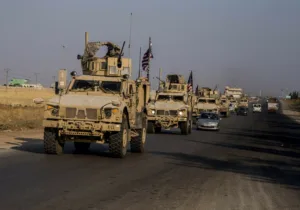American thinking on war has often (not always) been shaped by just war thinking, even if implicitly. Americans instinctively understand that war should be in response to an injury received, as Augustine said, and that war is not an excuse to murder civilians or inflict needless destruction. Last year, Congressman Jerry McNerney (D-CA-9) introduced a resolution (H.Res.1009) that stands in, clarifies, and makes explicit the American commitment to the just war tradition.
The resolution asks the House to determine before authorizing the use of armed force whether certain criteria drawn from the just war tradition have been met, starting with just cause. Interestingly, the resolution offers three possible just causes, each worth some comment.
The first just cause is “stopping a genocide or ethnic cleansing.” Past just war thinkers affirmed the right of sovereigns to use force to stop or punish “crimes against nature,” which, in their day, meant piracy, human sacrifice, cannibalism, and unusually brutal and murderous tyranny. Today, genocide, ethnic cleansing, and war crimes stand in the same place as the “crimes against nature” of the past. (I’d like to have seen the resolution include “war crimes” in this clause.)
The second just cause is “stopping grievous, massive, and irreparable harm to the environment.” This has never been affirmed as a just cause for war in the past—because past thinkers could not have contemplated the possibility that humans could render the planet uninhabitable. Environmental harm is a plausible, even literal, extension of “crimes against nature,” and thus this resolution could lead the way toward a novel, organic development of just war thinking. The difficulty (as with genocide, war crimes, and ethnic cleansing) is in defining the problem narrowly enough to make it specific and to prevent abuse, yet broad enough to make it useful. The resolution, unfortunately, offers no definition.
The third just cause is “protecting the United States or its allies from invasion or mass destruction.” I would prefer that this be the first criterion, as it is the most important; and I’d prefer looser language, such as protecting against any attack, not just those that rise to the level of “invasion” or “mass destruction.” But I do appreciate that this clause includes the defense of allies as a just cause. It is important to reaffirm clearly that cooperative security lies squarely within the tradition of just war thinking.
The resolution also includes some prudential criteria, including “whether the presumed benefits of the proposed action outweigh the harm done,” and “whether there is a reasonable probability that the proposed action will succeed.” These have an intuitive appeal, but they are effectively impossible to apply in practice with any kind of objectivity.
For example, no one initiates military action unless they believe it will succeed—yet, since wars usually have winners and losers, half are wrong. We seem unable to calculate ahead of time the likelihood of success with any accuracy.
Similarly, there is no simple cost-benefit formula that helps us figure out if the good outweighs the bad in war. The costs and benefits of war are not fully quantifiable. We can count dollars spent, lives lost, and munitions expended, but we cannot quantify security achieved, freedom restored, justice vindicated—or lost. There is no unit of measurement applicable to all domains in which there are costs or benefits of war.
The greatest strength of the resolution is its insistence that military action be “undertaken with the intent to reestablish peace.” This echoes Augustine’s insistence that war is only undertaken to establish a better peace—and it is, in my view, exactly what the United States did wrong in its wars in Iraq and Afghanistan (and Libya and Syria). The United States is excellent at winning war and losing peace, which is neither just nor intelligent. Perhaps this resolution will remind the House of its own responsibility to provide the funds, patience, and oversight required to make peacebuilding work better next time.
McNerney’s resolution is a welcome, if imperfect, step towards making America’s wars more just (and more effective). The just war tradition helps us see our own wars in clearer moral light: that the Union had just cause and the Confederacy did not; that we had just cause in World War II but, as that war devolved into the most barbaric war in history, we sometimes did not fight with proper discrimination. Just war helps us see that, again, we plainly had just cause in the war on terror, but we did not fight with proper attention to restoring peace. Thus, after 20 years, we killed a lot of terrorists, but there is no peace.
As the war in Ukraine grinds on, this resolution reminds us of the moral imperative to reestablish a just peace in its aftermath. That will certainly mean reconstruction assistance for Ukraine. What it means for Russia depends on how the war ends, on whether Putin’s regime is still in power, and on whether Russia is ready to accept responsibility for its crimes and undertake the reforms necessary to reenter the community of responsible nations. If not, there may be no peace on the horizon for some time to come.






